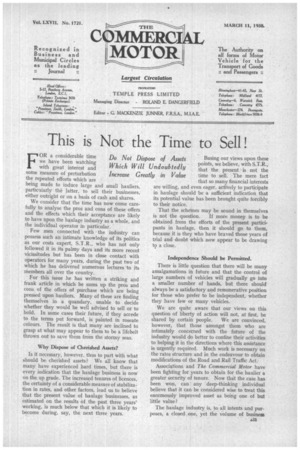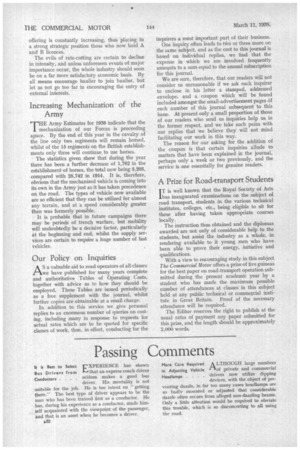This is Not the Time to Sell!
Page 33

Page 34

If you've noticed an error in this article please click here to report it so we can fix it.
FOR a considerable time we have been watching with great interest and some measure of perturbation the repeated efforts which are being made to induce large and small hauliers, particularly the latter, to sell their businesses, either outright or on a basis of cash and shares.
We consider that the time has now come carefully to analyse the pros and cons of these offers and the effects which their acceptance are likely to have upon the haulage industry as a whole, and the individual operator in particular.
Few men connected with the industry can possess such an intimate knowledge of its politics as our costs expert, S.T.R., who has not only followed it in its palmy days and its more recent vicissitudes but has been in close contact with operators for many years, during the past two of which he has delivered numerous lectures to its members all over the country.
For this issue he has written a striking and frank article in which he sums up the pros and cons of the offers of purchase which are being pressed upon hauliers. Many of these are finding themselves in a quandary, unable to decide whether they would be well advised to sell or to hold. In some cases their future, if they accede to the terms put forward, is painted in roseate colours. The result is that many are inclined to grasp at what may appear to them to be a lifebelt thrown out to save them from the stormy seas.
Why Dispose of Cherished Assets?
Is it necessary, however, thus to part with what should be cherished assets? We all know that many have experienced hard times, but there is every indication that the haulage business is now on the up grade. The increased tenures of licences, the certainty of a considerable measure of stabilization in rates, and other factors, lead us to believe that the present value of haulage businesses, as estimated on the results of the past three years' working, is much below that which it is likely to become during, say, the next three years. Basing our views upon these points, we believe, with S.T.R., that the present is not the time to sell. The mere fact that so many financial interests are willing, and even eager, actively to participate in haulage should be a sufficient indication that its potential value has been brought quite forcibly to their notice.
That the schemes may be sound in themselves is not the question. If more money is to be obtained from the efforts of the present participants in haulage, then it should go to them, because it is they who have braved those years of trial and doubt which now appear to be drawing to a close.
Independence Should be Permitted.
There is little question that there will be many amalgamations in future and that the control of large numbers of vehicles will gradually go into a smaller number of hands, but there should always be a satisfactory and remunerative position for those who prefer to he independent, whether they have few or many vehicles.
We are quite aware that our views on this question of liberty of action will not, at first, be shared by certain people. We are convinced, however, that those amongst them who are intimately concerned with the future of the industry would do better to confine their activities to helping it in the directions where this assistance is urgently required. Much work is necessary on the rates structure and in the endeavour to obtain modifications of the Road and Rail Traffic Act.
Associations and The Commercial Motor have been fighting for years to obtain for the haulier a greater security of tenure. Now that the case has been won, can any deep-thinking individual believe that it can be considered wise to treat this enormously improved asset as being one of but little value?
The haulage industry is, to all intents and purposes, a closed ,one, yet the volume of business offering is constantly increasing, thus placing in a strong strategic position those who now hold A and B licences.
The evils of rate-cutting are certain to decline in intensity, and unless unforeseen events of major importance occur, the whole industry should soon be on a far more satisfactory economic basis. By all means encourage haulier to join haulier, but let us not go too far in encouraging the entry of external interests.
Increasing Mechanization of the Army
THE Army Estimates for 1938 indicate that the mechanization of our Forces is proceeding apace. By the end of this year in the cavalry of the line only two regiments will remain horsed, whilst of the 13 regiments on the British establishments only three will continue to use horses.
The statistics given show that during the year there has been a further decrease of 1,762 in the establishment of horses, the total now being 5,205, compared with 28,742 in 1914. It is, therefore, obvious that the mechanized vehicle is coming into its own in the Army just as it has taken precedence on the road. The types of vehicle now available are so efficient that they can be utilized for almost any terrain, and at a speed considerably greater than was formerly possible.
It is probable that in future campaigns there may be periods of trench warfare, but mobility will undoubtedly be a decisive factor, particularly at the beginning and end, whilst the supply services are certain to require a huge number of fast vehicles.
Our Policy on Inquiries
A S a valuable aid to road operators of all classes we have published for many years complete and authoritative Tables of Operating Costs, together with advice as to how they should be employed. These Tables are issued periodically as a free supplement with the journal, whilst further copies are obtainable at a small charge. In addition to this service we give personal replies to an enormous number of queries on costing, including many in response to requests for actual rates which are to be quoted for specific classes of work, thus, in effect, conducting for the inquirers a most important part of their business.
One inquiry often leads to tivo or three more on the same subject, and as the cost to this journal is based on individual replies, we find that the expense in which we are involved frequently amounts to a sum equal to the annual subscription for this journal.
We are sure, therefore, that our readers will not consider us unreasonable if we ask each inquirer to enclose in his letter a stamped, addressed envelope, and a coupon which will be found included amongst the small-advertisement pages of each number of this journal subsequent to this issue. At present only a small proportion of those of our readers who send us inquiries help us in the former respect, and we take such pains with our replies that we believe they will not mind facilitating our work in this way.
The reason for our asking for the addition of the coupon is that certain inquiries allude to matters that have been explained in the journal, perhaps only a week or two previously, and the service is one essentially for genuine readers.
A Prize for Road-transport Students
I T is well known that the Royal Society of Arts has inaugurated examinations on the subject of road transport, students in the various technical institutes, colleges, etc.. being eligible to sit for these after having taken appropriate courses The instruction thus obtained and the diplomas awarded are not only of considerable help to the students, but assist the industry as a whole, in rendering available to it young men who have been able to prove their energy, initiative and qualifications.
With a view to encouraging study in this subject The Commercial Motor offers a prize of five guineas for the best paper on road-transport operation submitted during the present academic year by a student who has made the maximum possible number of attendances at classes in this subject held at any public technical or commercial institute in Great Britain. Proof of the necessary attendance will be required.
The Editor reserves the right to publish at the usual rates of payment any paper submitted for this prize, and the length should be approximately 2,000 words.
















































































